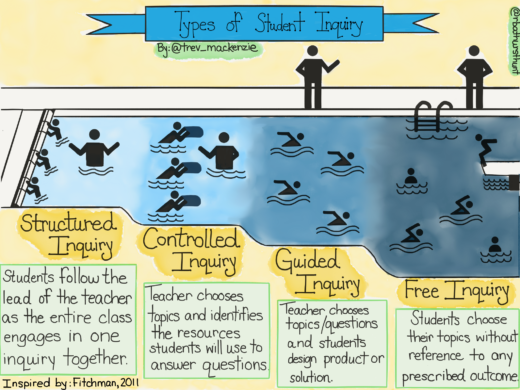Inquiry emphasizes the importance of students engaging in authentic, real-world investigations that build knowledge and understanding. The content highlights the significance of technology in facilitating inquiry-based learning and how teachers can use various types of questions to promote active learning. When students have questions that the teacher cannot answer or that require the gathering of multiple points of view or types of data, the use of technology can be crucial.
inquiry is important because it promotes student-centered learning through inquiry-based approaches, which encourages deeper understanding and critical thinking. It also underscores the role of technology in enhancing learning experiences and offers guidance to teachers on how to support inquiry in their classrooms.
This topic might make readers consider the significance of providing students with opportunities to explore real-world questions and issues, promoting self-regulated learning and developing competencies relevant to real-life scenarios.

I as Teachers can use this information to design inquiry-based lessons that integrate technology purposefully. I can encourage students to engage in active exploration, collaborate with experts, and communicate their learning effectively using various forms of expression. In this example, a science teacher designs an inquiry-based project for students to investigate water pollution in their local community. The teacher incorporates technology by providing laptops and tablets for research, using digital probes for real-time water quality tests, and employing digital tools like spreadsheets and graphs for data analysis. Virtual meetings with environmental experts via video conferencing offer valuable insights, while students create multimedia presentations to share their findings. An online platform encourages continuous collaboration and reflection beyond the classroom. By integrating inquiry-based learning with technology, students actively engage, develop critical thinking, and deepen their understanding of environmental issues through real-time data access, expert connections, and dynamic presentations.

Do you know students are the primary beneficiaries, as they will experience more meaningful and relevant learning experiences through inquiry-based approaches. Teachers can benefit from implementing such strategies to create a more engaging and effective learning environment.
I think implementing inquiry-based learning may present challenges, such as designing appropriate assessments, managing technology integration, and providing ongoing support for students’ self-regulated learning. However, with proper planning and support, these challenges can be addressed effectively.
Reference: https://www.thirteen.org/edonline/concept2class/inquiry/explor_sub4.html